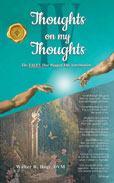
 |
Thoughts on My Thoughts IV: The TALES That Wagged this Veterinarian
by Dr. Walter R. Hoge
MainSpring Books
Building off the author's prior volumes, Hoge's fourth offering traverses the spectrum of topics in a conversational manner, much like a friend would over a cup of coffee. The musings and observations, though, are carefully crafted and put together right from the beginning as the author juxtaposes Michelangelo’s work and gender equality. While the author fearlessly analyzes his observations, he focuses more on creating a thought-provoking environment and a culture of conversation and discourse that can stimulate even more discussions and probing.
Early in his text, he dives into free will and presents vignettes that incorporate everything from murder trials and biblical narratives to physiology and cognition. Giving it a more nuanced dimension, Hoge even explores whether animals have free will, surveying concepts such as animal agency and animal nature. What's truly fascinating is that Hoge does not necessarily present new topics, but he examines known, relatable ideas from an extraordinary perspective. For instance, he uses evidence from the Bible to counter the argument from some theorists that only human beings have souls.
Although the topics meander randomly from section to section without any distinctive connection, the connection and relatability come from the notion that Hoge’s work is truly a representation of how thoughts operate. Thousands of thoughts bounce around daily, pinballing throughout the brain, connected innately by their human experience. For example, in one bubble, there are Timothy McVeigh’s last moments. In another, philosophy reigns supreme with the focus on starting with the end in mind. Yet another bubble comments on temptation, indulgence, and death through the frame of reference of a bee.
Whether the conversation revolves around the regeneration of 30,000-year plants derived from the “fruit tissue that had been frozen in Siberian permafrost” or the astounding fact that the often celebrated, even revered “sport” of bullfighting claims the lives of 250,000 bulls annually, the redeeming quality of this narrative lies in the undeniable evidence. Despite the tone being conversational, the content is impeccably researched and supported with insurmountable evidence that captures the spirit of the content. Hoge presents each of his topics with such clarity and force that he does not need to coax readers to believe him: the evidence more than suffices. In the case of bullfighting, it is particularly heartbreaking to learn about the mistreatment of the animals and humanity’s penchant for turning the plight of animals into sport for nothing more than their own pleasure.
In the same vein, the author’s veterinary background shines through when he examines the highly intelligent nature of pigs and, on a grander scale, their role in modern medicine in realms such as organ transplants. The history of pigs in medicine, such as how implants made of pig bladder were instrumental in regrowing leg muscles, is downright astounding. The author is the one choosing the topic he wants to discuss, so in that regard, this is no encyclopedia. However, the depth and uniqueness of the topics he has selected in this volume trend away from mainstream conversations and are genuinely enlightening, perhaps even providing more knowledge and context than any encyclopedia could. Overall, Hoge’s thoughts encompass nearly six decades and an endless reservoir of highly intriguing and well-sourced topics that make this volume an undeniably meaningful read.
RECOMMENDED by the US Review